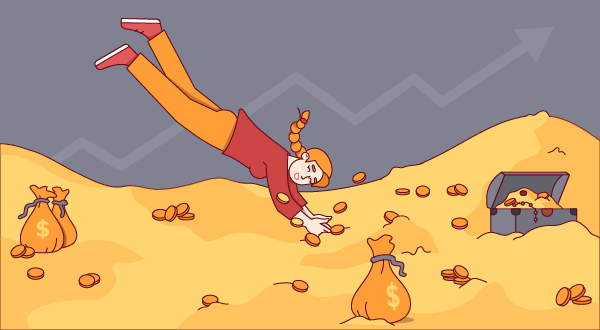Founders don't get lucky — that's how lottery winners make their money.
From the outside, though, it often looks the same. People read about a company going public or hear about some Founder they know getting their startup acquired and think "Wow, what good luck they've had!"
They view our windfall as some stroke of luck, and as importantly they view our proceeds as something that should be doled out to everyone. In the worst case, they may even try to make us feel guilty about such great fortune — if we haven't already done that to ourselves.
It wasn't "Good Luck" it was "Good Fortune"
In order for a Founder to exit they couldn't rely on luck. Luck is what happens when we're at the blackjack table and you get dealt an ace and a king. Luck is what happens when we buy a random lottery ticket and through some benevolent force of chaos, the very same numbers are called to win.
Fortune is what happens when we show up, day after day, against all odds, trying to create something in the universe that would have never existed without us. It's becoming a professional CEO and working with a co-founder in the early days of a startup when investors won't take interest and you're bootstrapping the business despite all the risk.
Good fortune is what happens when the sum total of all that effort turns into some giant pile of cash that would have never existed without us. It's a successful exit strategy by way of acquisition coming to fruition. It's letting go of other projects and putting everything you have into taking your business from idea, to business model, to a full-on functioning startup.
We may have had some luck along the way, but luck doesn't pay bills — effort does.

Our Good Fortune isn't Someone Else's Fortune
The challenge with having good fortune is that it's often very visible to others, whether we intend it to be or not. In most cases, the first reaction for those that hear about our good fortune will be "How will this affect me? Where is my share?"
It's everywhere, whether it's the third to last employee we just hired or the third cousin twice-removed who we didn't even know existed until we just got that random Facebook friend request. Nobody is around when we need funds for our "little computer thing" but everyone seems to take interest as soon as that thing turns into wily technology.
Sometimes we need a reminder that it's our money to give if we choose, but no one else's to take as they please. We earned it, they didn't. That's how this works.

Enjoy Every Penny
When I'm fortunate enough to speak to a Founder who has recently had any kind of wealth event I always open with the same response "Enjoy every single penny. You've earned it. Whatever you do with it, don't feel guilty, don't think twice."
Oddly that advice is rarely heeded. Most Founders feel incredibly guilty about their newfound wealth, no matter how hard they worked to get it. We live in a world of disproportionate gains, and it's nearly impossible to overlook that.
To that I would offer this consideration — no one has anything to say when we lose. No one comes to a failed Founder and says "So sorry you've risked and lost everything, here's how I'm going to repay all of your losses!"

Our Losses, Our Wins
If we're going to be in a business where no one is concerned with our risks and losses then we have to accept a world where no one should have a say in our victories.
You've earned every penny my fellow Founder — now go enjoy it!
Find this article helpful?
This is just a small sample! Register to unlock our in-depth courses, hundreds of video courses, and a library of playbooks and articles to grow your startup fast. Let us Let us show you!
Submission confirms agreement to our Terms of Service and Privacy Policy.
Start a Membership to join the discussion.
Already a member? Login
This has the right sentiment - but hard disagree on being lucky at the right time. Annie Duke explains it really well in her book about Thinking in Bets - there is the right combination of hard work and luck needed for things to work out. We default to blaming bad luck when things don't work out but want to give ourselves the credit when things do. I have also had a good exit - and it's easy to discount the importance of luck during these times and feel bitter towards others who overindex on the luck component.
IMHO the ability to 'luck' into things is a finely tuned skill borne through hard work - knowing how and when we can 'get lucky' requires considerable talent, dedication and hard work, and there's no shame in admitting or working towards that.